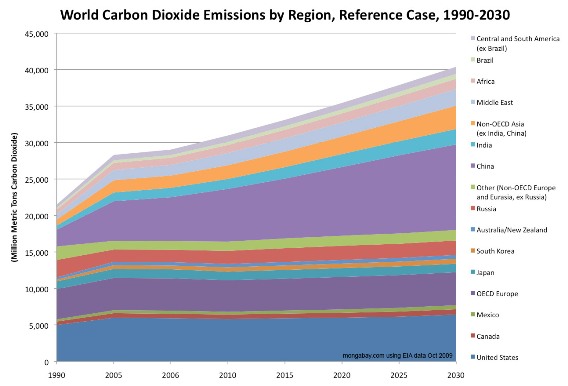Evaluating 163 nations on their environmental performance, the Environmental Performance Index (EPI) has named Iceland the most environmental nation. Released every two years, the EPI also found that the world’s two largest super-powers—China and the US—have both fallen behind on confronting environmental challenges.
Despite being at the top of the list, Iceland continues to face criticism from environmentalists for its resumption of commercial whaling and single-handily blocking an international ban on deep-sea trawling, a fishing-method that tears up the sea floor, drastically impacting marine life and ecosystems.
The EPI looks at ten different environmental categories for each nation, including environmental health, air quality, water resource management, biodiversity and habitat, forestry, fisheries, agriculture, and climate change.
Iceland won top place for its work on environmental public health, combating greenhouse gas emissions, and reforestation. Other European nations—Switzerland (2nd), Sweden (4th) and Norway (5th)—also took top places, while Costa Rica (3rd) was the highest non-European nation.
Poverty stricken nations with little-to-no-environmental policy took the bottom five places: in descending order, Togo, Angola, Mauritania, the Central African Republic, and lastly Sierra Leone.
The United States was 61st on the list, plunging twenty-two places from 2008, largely due to the super-powers failure to deal with greenhouse gas emissions as well as air pollution problems in certain areas. The United States is soundly beaten by other industrialized nations, such as France (7th), the United Kingdom (14th), Germany (17th), and Japan (20th). Both Cuba (9th) and Colombia (10th) also far outrank the United States.
However, the ranking does not take into account the first year of the Obama Administration, which has had varying success on climate change, since the ranking takes into account data from pre-2009.
The US’ neighbor to the north, Canada, also took a big plunge, falling from 12th place to 46th. Canada has come under increasing criticism for its stagnant climate change policies and its tar sands industry.
China tumbled, as well, over the past two years: falling 16 places. Coming in at number 121, China faces huge pollution problems due to rapid and largely unregulated industrialization.
The EPI is created by experts from Yale and Colombia University.

According to the Energy Information Administration, after China and the United States, among major polluters only India is expected to have significant growth of emissions over the next 20 years.
For the full ratings and more information: http://epi.yale.edu/
Related articles
New report: world must change model of economic growth to avert environmental disaster
(01/25/2010) For decades industrialized nations have measured their success by the size of their annual GDP (Gross Domestic Product), i.e. economic growth. The current economic model calls for unending growth—as well as ever-rising consumerism—just to remain stable. However, a new report by the New Economics Foundation (nef) states that if countries continue down a path of unending growth, the world will be unable to tackle climate change and other environmental issues.
Canadians say climate change bigger threat than terrorism
(01/11/2010) A new poll shows that Canadians now see climate change as a larger threat than terrorism, even though their government has largely scaled back efforts to combat climate change. Half of the poll’s respondents said that climate change was a ‘critical threat’, while only a quarter said the same about terrorism.
Saving biodiversity ‘on the same scale’ as climate change: German Chancellor
(01/11/2010) In a kick-off event for the UN’s Year of Biodiversity, German Chancellor Angela Merkel, compared the importance of saving biodiversity to stopping climate change.